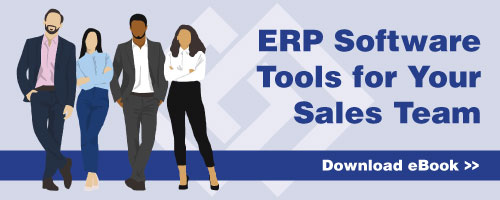ERP software is designed to streamline all aspects of a company’s operations – this includes inventory, accounting, contact management, order entry and processing, warehouse management and everything in-between. As a wholesale distribution company, this allows you to process and ship more orders with fewer people, ultimately achieving the goal of any company; increasing sales while reducing costs. However, any successful company will know that it takes more than efficient processes to grow sales; it also involves managing customer relationships and keeping customers happy. The customer is King, and proper ERP software can provide you with tools to better engage your customers while making their lives easier as well.
CRM
An ERP system with an integrated Customer Relationship Management component allows you to keep track of all of your vendor, prospect and customer information in one central database. A strong CRM system lets you input customer data, log field changes and sales rep information, set follow-up dates, maintain a record of verbal and email communication, specify primary contact information and link to any outstanding invoices or quotes. Using a CRM will help your company stay organized and keep customers satisfied, ensuring that any information about customers and prospects is easily accessible with action items clearly displayed.
Customer Portal
A customer portal or online ordering system provides a place for customers to place orders online, view their order history, browse available inventory information in real time and see specific pricing. With this feature, customers receive login information for a back-end website that essentially acts as a restricted eCommerce platform. Customers are then able to access their accounts and place orders without intervention from sales reps at the company, saving time and giving the customer more control. The website is integrated with the ERP system, so inventory will always be up-to-date, and order details accurate. This also means once an order is placed online, the inventory is allocated in the back end and sales order created. Particularly in B2B markets, companies often have repeat clients, so a feature like this is very useful – customers can log in to reorder product or place new orders.
EDI Integration
If you are distributing to large companies or retail chains, they often require EDI functionality to do business. An ERP system that allows for EDI-ERP integration, ensures that information is being sent and received in the correct format to maintain specific standards. This eliminates the need for double entry and reduces the number of errors from manual entry. Strong integration and meeting EDI standards will first and foremost keep your large clients happy, but it will also provide a number of other benefits for your organization internally.
Automated Reports & Email Notifications
A proper ERP system will allow you to send customized reports and email notifications to customers. This includes quotes and invoices, as well as tracking information if they order product that needs to be shipped. Customers can also be sent statements at specified time intervals (every week, month, quarter etc.), listing their order history, as well as any outstanding balances. Strong ERP systems have the ability to pull information from different areas of the software to customize virtually any report your customer may want. The examples mentioned are just a start – you should work with your ERP provider and your customers to determine what reports customers might need and how they can be created in the system.
Fully integrated ERP systems help companies better manage their inventory and accounting and streamline the order taking, order entry, and order fulfillment process. Aside from these internal benefits though, look for a system that provides tools that simplify the order process for customers and allows employees to easily view and enter customer data in order to maintain strong relationships and keep customers happy.











